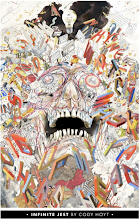With the modern popularity of books like Twilight and the Da Vinci Code it's easy to think of books as merely forms of entertainment, and reading solely for entertainment certainly is one possible way to read. But novels have also historically been written as ideological tools, used to expose problems in society and thusly create change.
This quarter we will be reading Infinite Jest productively, keeping in mind that David Foster Wallace was not only writing a book that will make us laugh, and that we won't want to put down, but also a novel that is supposed to make us think, to challenge us as readers. Using E Unibus Pluram as a critical lens for IJ makes it easier to keep in mind some of the issues that IJ is trying to expose and explore.
As we went over in class, some of the points that Wallace makes in EUP to keep in mind while reading Infinite Jest:
1. Irony is a medium used to expose, and has historically been used as a tool for social change. Unfortunately TV and modern American culture have subsumed irony, making irony an ineffective way to ridicule current social institutions. So to create social change today we need to not only tear something down, not only negatve, but to also create something new, to instatiate some positive values for social change.
What does Wallace do in Infinite Jest? Is he attempting to build something up or tear something down? Is he successful at either one or both?
2. The average American watches 6 hours of TV a day. Watching TV and movies has become of the the main social activities in modern America, one of the primary topics of American conversation. What do human relationships look like in a world dominated by watchers? What kind of relationships do the people in IJ have?
3. At the end of his essay Wallace says that: "The next real literary "rebels" in this country might well emerge as some weird bunch of "anti-rebels," born oglers who dare to back away from ironic watching, who have the childish gall actually to endorse single-entendre values. Who treat old untrendy human troubles and emotions in U.S. life with reverence and convitiction. Who eschew self-consciousness and fatigue...Real rebels, as far as I can see, risk things. Risk disapproval...The new rebels might be the ones willing to risk the yawn, the rolled eyes, the cool smile, the nudged ribs, the parody of gifted ironists, the "How banal." Accusations of sentimentality, melodrama. Credulity. Willingness to be suckered in by a wrold of lurkers and starers who fear gaze and ridicule above imprisonment without law."
Is Wallace just such a rebel? Is he attempting to be?
Wednesday, March 31, 2010
Subscribe to:
Posts (Atom)

